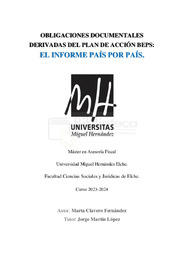Resumen :
La creciente interdependencia y conexión entre las economías ha transformado la forma en la que operan las empresas, generando nuevas oportunidades de negocio en cualquier parte del mundo, sin embargo, también ha abierto una puerta a las prácticas fiscales abusivas en relación con la optimización fiscal a través del aprovechamiento de lagunas regulatorias.
Entre estas prácticas, destacan, por ser las que más impacto generan en la sociedad, las utilizadas por empresas multinacionales, las cuales, trasladaban beneficios a jurisdicciones de baja o nula tributación mediante la fijación de precios de transferencia. Teniendo en cuenta la importancia de esta cuestión para la fiscalidad internacional, y observando que los precios de transferencia abrían el paso a las prácticas abusivas, el presente trabajo versa sobre la forma de combatirlo, esto es, sobre el informe país por país.
Esta figura es un claro reflejo de la actualización que las legislaciones deben (y están) realizando para adaptarse a los nuevos tiempos y a las nuevas prácticas de eludir impuestos. Por lo que, afirmamos que esta cuestión se encuentra enmarcada en la lucha contra la elusión y fraude fiscal.
El estudio se ha realizado desde una doble perspectiva (internacional e interna). En él se ha valorado su efectividad, su grado de aceptación y cumplimiento por parte de las empresas, sus oportunidades y debilidades a nivel interno, y, sobre todo, si logra el objetivo para el que se creó; reducir las operaciones que se encuentran en el límite de la elusión fiscal internacional.
The growing interdependence and connection between economies has transformed the way in which companies operate, generating new business opportunities in any part of the world; however, it has also opened a door to abusive tax practices in relation to tax optimization by taking advantage of regulatory loopholes.
Among these practices, those used by multinational companies, which moved profits to jurisdictions with low or no taxation by means of transfer pricing, stand out as the ones that have the greatest impact on society. Taking into account the importance of this issue for international taxation, and noting that transfer pricing opened the way to abusive practices, this paper deals with the way to combat it, i.e., the country-by-country report.
This figure is a clear reflection of the updating that legislations must (and are) carrying out to adapt to new times and new tax avoidance practices. Therefore, we affirm that this issue is part of the fight against tax avoidance and evasion.
The study has been carried out from a double perspective (international and domestic). It has assessed its effectiveness, its degree of acceptance and compliance by companies, its opportunities and weaknesses at the internal level, and, above all, whether it achieves the objective for which it was created; to reduce the number of transactions that are not subject to tax evasion and avoidance.
|
.png)
